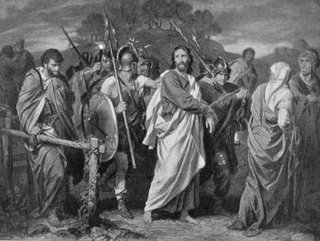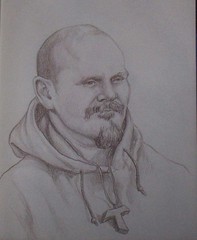Thursday, March 16, 2006
Lenten Reading--Thursday, Second Week of Lent
 Today's reading is from the Gospel of Luke, Chapter 22, verses 52 and 53:
Today's reading is from the Gospel of Luke, Chapter 22, verses 52 and 53:And Jesus said to the chief priests and temple guards and elders who had come for him, "have you come out as against a robber, with swords and clubs? Day after day I was with you in the temple area, and you did not seize me; but this is your hour, the time for the power of darkness.
Before his arrest, Jesus had become a popular preacher in the temple courtyard. Some of the Sanhedrin had openly debated him, but his popularity with the people prevented them from charging him openly in public. These verses of Luke from the Passion of Jesus (Luke 22 and 23) are some of the most historical-sounding in the Bible. It's difficult to look at them allegorically. But from a big-picture perspective, the stories of Luke from the Last Supper to Jesus' Burial are our story. They are the story of our struggle over fear. We are Peter as he rejects Jesus in the temple courtyard. We are Mary Magdalene and Jesus' Mother at the foot of the cross, mourning the loss of Love and Compassion in the world. We are even Judas, as he betrays his Master with a kiss.
Spiritual practices demand a great deal from us. Time to do them, a commitment to the type of life they compel us to lead, and the doubt and fear and darkness that arises when the Splendors of dee
 p meditation seem to dry up for long or short periods and we seem lost. St. John of the Cross called these times "the dark night of the soul," and it is these times which we find expressed in the life of Jesus during the Passion. This period is represented in the liturgical year on the "three days" (actually 1 1/2 days) from Friday afternoon (Good Friday) till Sunday Morning (Easter) of Holy Week. St. John expressed his vision of Jesus' crucifixion in a sketch. In this sketch, Jesus seems to be hanging from the cross, almost being dragged down by the weight of the world's sins. It is these times when faith is most required. Faith is often defined in terms of what we cannot see, with emphasis on John 20:29. However, the Indian saint Paramhansa Yogananda defined Faith as the conviction of God's existence that comes with personal experience. John 20:29 can still apply here, however. I believe that when addressing Thomas, Jesus speaks not to "blind faith," in believing in something even though one has never seen it (aka: never having experience the Truth of the Living Christ), but faith in that even though you cannot see God now, He has not abandoned you, and is still present with you, even if your inner sight is diminished. It is in these times that we must hold onto the blessings of past inner experiences and remember that when Christ returns and we have powerful experiences again, they will be all the more cherished because of their absence.
p meditation seem to dry up for long or short periods and we seem lost. St. John of the Cross called these times "the dark night of the soul," and it is these times which we find expressed in the life of Jesus during the Passion. This period is represented in the liturgical year on the "three days" (actually 1 1/2 days) from Friday afternoon (Good Friday) till Sunday Morning (Easter) of Holy Week. St. John expressed his vision of Jesus' crucifixion in a sketch. In this sketch, Jesus seems to be hanging from the cross, almost being dragged down by the weight of the world's sins. It is these times when faith is most required. Faith is often defined in terms of what we cannot see, with emphasis on John 20:29. However, the Indian saint Paramhansa Yogananda defined Faith as the conviction of God's existence that comes with personal experience. John 20:29 can still apply here, however. I believe that when addressing Thomas, Jesus speaks not to "blind faith," in believing in something even though one has never seen it (aka: never having experience the Truth of the Living Christ), but faith in that even though you cannot see God now, He has not abandoned you, and is still present with you, even if your inner sight is diminished. It is in these times that we must hold onto the blessings of past inner experiences and remember that when Christ returns and we have powerful experiences again, they will be all the more cherished because of their absence.